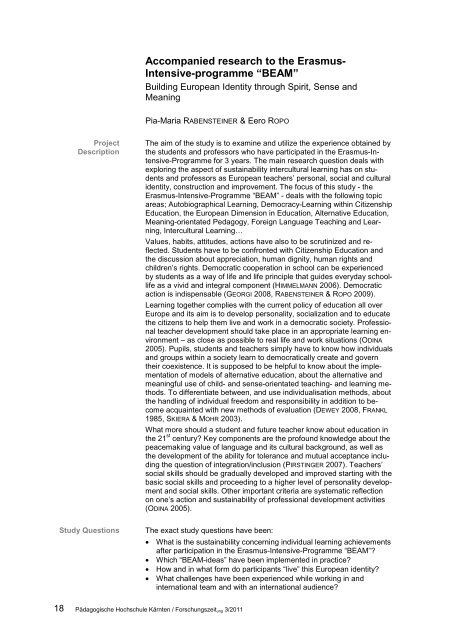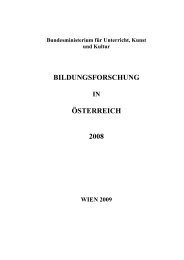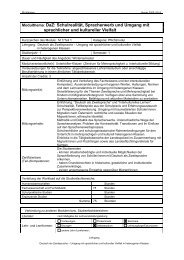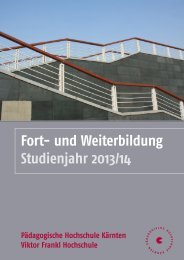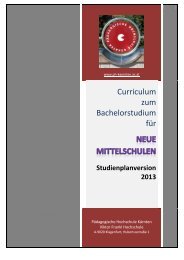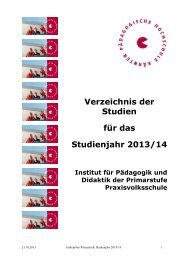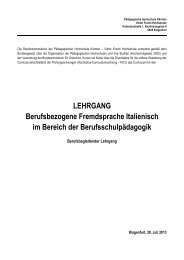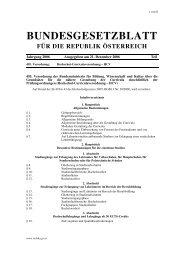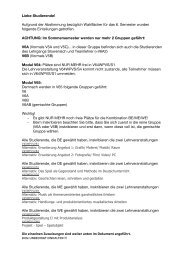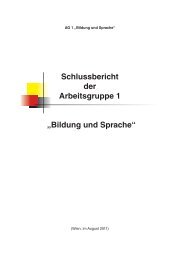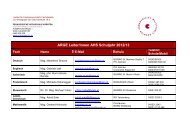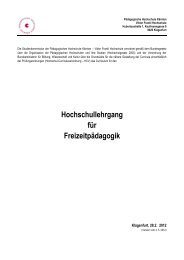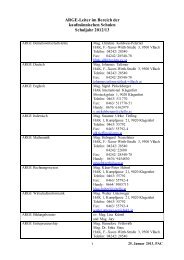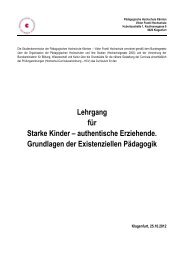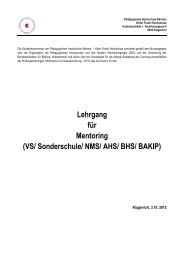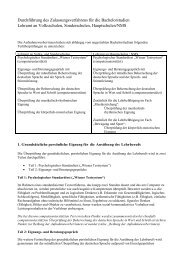LERNEND - Pädagogische Hochschule Kärnten
LERNEND - Pädagogische Hochschule Kärnten
LERNEND - Pädagogische Hochschule Kärnten
Sie wollen auch ein ePaper? Erhöhen Sie die Reichweite Ihrer Titel.
YUMPU macht aus Druck-PDFs automatisch weboptimierte ePaper, die Google liebt.
18<br />
Project<br />
Description<br />
Study Questions<br />
Accompanied research to the Erasmus-<br />
Intensive-programme “BEAM”<br />
Building European Identity through Spirit, Sense and<br />
Meaning<br />
Pia-Maria RABENSTEINER & Eero ROPO<br />
The aim of the study is to examine and utilize the experience obtained by<br />
the students and professors who have participated in the Erasmus-Intensive-Programme<br />
for 3 years. The main research question deals with<br />
exploring the aspect of sustainability intercultural learning has on students<br />
and professors as European teachers’ personal, social and cultural<br />
identity, construction and improvement. The focus of this study - the<br />
Erasmus-Intensive-Programme “BEAM” - deals with the following topic<br />
areas; Autobiographical Learning, Democracy-Learning within Citizenship<br />
Education, the European Dimension in Education, Alternative Education,<br />
Meaning-orientated Pedagogy, Foreign Language Teaching and Learning,<br />
Intercultural Learning…<br />
Values, habits, attitudes, actions have also to be scrutinized and reflected.<br />
Students have to be confronted with Citizenship Education and<br />
the discussion about appreciation, human dignity, human rights and<br />
children’s rights. Democratic cooperation in school can be experienced<br />
by students as a way of life and life principle that guides everyday schoollife<br />
as a vivid and integral component (HIMMELMANN 2006). Democratic<br />
action is indispensable (GEORGI 2008, RABENSTEINER & ROPO 2009).<br />
Learning together complies with the current policy of education all over<br />
Europe and its aim is to develop personality, socialization and to educate<br />
the citizens to help them live and work in a democratic society. Professional<br />
teacher development should take place in an appropriate learning environment<br />
– as close as possible to real life and work situations (ODINA<br />
2005). Pupils, students and teachers simply have to know how individuals<br />
and groups within a society learn to democratically create and govern<br />
their coexistence. It is supposed to be helpful to know about the implementation<br />
of models of alternative education, about the alternative and<br />
meaningful use of child- and sense-orientated teaching- and learning methods.<br />
To differentiate between, and use individualisation methods, about<br />
the handling of individual freedom and responsibility in addition to become<br />
acquainted with new methods of evaluation (DEWEY 2008, FRANKL<br />
1985, SKIERA & MOHR 2003).<br />
What more should a student and future teacher know about education in<br />
the 21 st century? Key components are the profound knowledge about the<br />
peacemaking value of language and its cultural background, as well as<br />
the development of the ability for tolerance and mutual acceptance including<br />
the question of integration/inclusion (PIRSTINGER 2007). Teachers’<br />
social skills should be gradually developed and improved starting with the<br />
basic social skills and proceeding to a higher level of personality development<br />
and social skills. Other important criteria are systematic reflection<br />
on one’s action and sustainability of professional development activities<br />
(ODINA 2005).<br />
The exact study questions have been:<br />
• What is the sustainability concerning individual learning achievements<br />
after participation in the Erasmus-Intensive-Programme “BEAM”?<br />
• Which “BEAM-ideas” have been implemented in practice?<br />
• How and in what form do participants “live” this European identity?<br />
• What challenges have been experienced while working in and<br />
international team and with an international audience?<br />
<strong>Pädagogische</strong> <strong>Hochschule</strong> <strong>Kärnten</strong> / Forschungszeitung 3/2011


